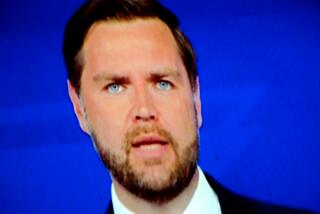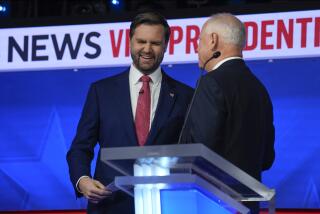There’s No Debate: Polls Won’t Be Tipped by VP ‘Showdown’
- Share via
DANVILLE, Ky. — Vice presidential nominees Dick Cheney and Joseph I. Lieberman engaged Thursday in a smooth but unrelentingly low-key encounter more likely to burnish their own images than materially affect the contest for the White House.
Throughout their 90-minute session, Lieberman and Cheney were both calm and collected--in many ways more so than presidential nominees Al Gore and George W. Bush appeared in their frenetic first debate Tuesday night. Neither was as overeager as Gore looked at times, nor as uneasy and anxious as Bush appeared in some moments.
If the principal task of the vice presidential nominee is to convince Americans that he’s ready to assume the presidency in a crisis, each seemed to easily pass the test. “No question, there were no stature issues here,” said one senior Republican consultant.
Yet neither significantly advanced the arguments that Gore and Bush began Tuesday night--and will continue in two more debates over the next 12 days. Sen. Lieberman and Cheney both restated their side’s central positions on issues from the budget surplus to foreign policy without opening new avenues of disagreement.
Debate Will Do Little to Change Dynamics
And, despite predictions to the contrary, both steered well clear of the vice presidential nominee’s traditional attack-dog role of denouncing the opposing presidential nominee in language their own nominee usually wouldn’t dare use himself. The closest they came--and it wasn’t very close--was when Cheney accused Gore of lacking the instincts to build bipartisanship in Washington.
For all those reasons, analysts on both sides said afterward that the debate was unlikely to noticeably change the basic dynamic of the race, which has seen Gore seize a modest lead over Bush in most national surveys.
The vice presidential debate is a bit like a medieval duel where nobles would send out seconds to do their fighting; like its predecessors, this encounter was less about the candidates on the stage than the men who had chosen them to be there.
On a night when few sparks flew, the stylistic differences between the two men may have been the most intriguing.
Democrat Lieberman was more emphatic and enthusiastic, gesturing briskly with his hands; Republican Cheney was soft-spoken, folding and unfolding his hands like a small-town banker. Cheney was far more comfortable discussing Bush’s agenda than he appeared in his first weeks on the campaign trail this summer. When Lieberman wanted to underscore a point his voice grew louder; when Cheney reached for emphasis he spoke more softly.
A Cheney Advantage on Foreign Policy
Lieberman spoke with more consistent verve and color, but Cheney also displayed a quick wit that he has kept well hidden on the campaign trail. Gently gibing Cheney for his multimillion-dollar compensation as chief executive officer of Halliburton Co., Lieberman suggested that his wife might want him to go into the private sector himself. Cheney quickly cut in: “I’m going to try to help you do that, Joe.”
At several points--Lieberman on the budget and on intervention in Bosnia, Cheney on education--the vice presidential contenders made their ticket’s case more crisply and clearly than their running mates.
Both managed to discuss the forest of policy proposals their campaigns have issued without getting lost in the reams of statistics that entangled the presidential nominees, especially Gore. Cheney, the former secretary of Defense, was so fluid in discussing foreign policy issues such as Iraq and the Middle East peace talks that he could potentially create an unfavorable comparison with Bush, who seemed more tentative in discussing world affairs Tuesday night.
Only rarely did the temperature seem to rise between Cheney and Lieberman. Each jabbed sharply at the other when Cheney accused President Clinton of allowing the military to deteriorate under his presidency--and Lieberman accused Cheney of running down the American fighting force.
Later, Lieberman bristled when Cheney argued that Clinton had failed to hold together the international coalition against Iraq that Cheney helped to assemble as Defense secretary during the 1991 Persian Gulf War. After noting that he crossed party lines to support the military action, Lieberman pointedly added: “The war did not end with a total victory, and Saddam Hussein remained there.”
They clashed again when Cheney argued that Gore’s sharp-edged populist campaign rhetoric would make it difficult for the vice president to bridge partisan divides as president. “There is an awful lot of evidence that there hasn’t been any bipartisan leadership out of this administration or Al Gore,” Cheney charged.
Lieberman, noting Gore’s role in fashioning bipartisan agreements on welfare reform and the balanced-budget bill of 1997, fired back: “Dick Cheney must be one of the few people in America who think nothing has been accomplished in the last eight years.”
Unlikely Contenders in 2004 Election
All of the five previous debates between vice presidential contenders since 1976 have been more a matter of curiosity than consequence. “I’m not aware of any evidence of a race being altered as a result of it,” said Thomas E. Mann, a political scientist at the Brookings Institution in Washington.
Even in 1988, when Democrat Lloyd Bentsen bested Republican Dan Quayle in what may have been the most one-sided of these encounters, polls after the debate showed the Democratic ticket failing to narrow the GOP’s lead. In 1996, Gore was widely judged a clear winner over Republican Jack Kemp--but the polls showed no increase in Clinton’s already formidable lead over Bob Dole.
Sometimes--as in that 1996 encounter--the debates have generated interest as a showcase for future presidential contenders. But that seems less likely this year: at 59, with three heart attacks in his past, Cheney isn’t expected to seek the GOP nomination in 2004 if Bush loses.
And while Lieberman can’t be ruled out as a future candidate if Gore falls, the senator’s controversial views on such issues as affirmative action--and his religious background--create complications that could cloud his prospects of seeking the top job as well.
On this night, though, Cheney and Lieberman showed themselves every bit as capable--and sometimes a bit more so--of thriving in the spotlight as the candidates they were there to support.
More to Read
Get the L.A. Times Politics newsletter
Deeply reported insights into legislation, politics and policy from Sacramento, Washington and beyond. In your inbox twice per week.
You may occasionally receive promotional content from the Los Angeles Times.










